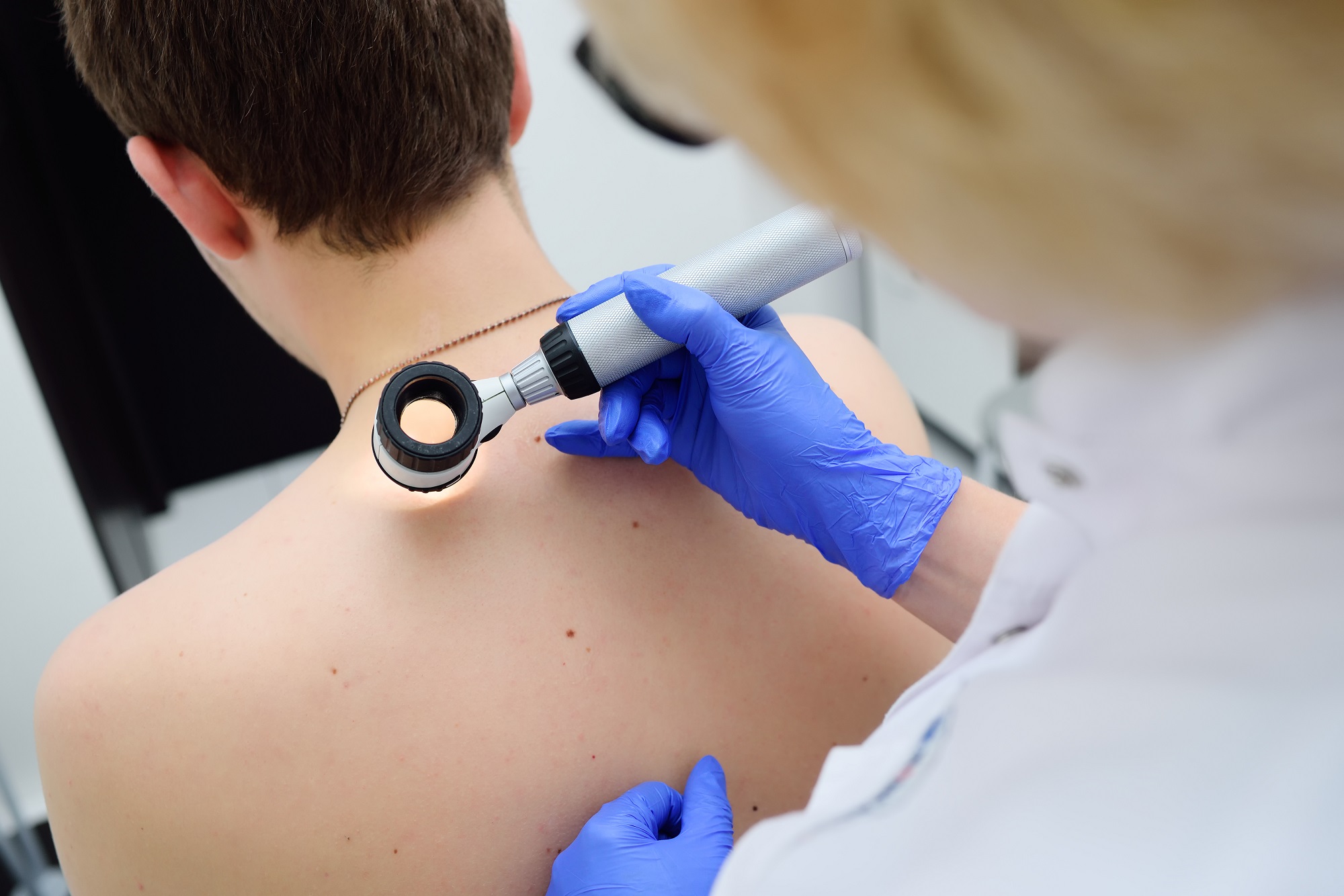What Does Skin Cancer Look Like? And Other Common Questions
5 min read

Author: Patrick Eulitt, MD
Covering the entire body, the skin is your largest organ. So it’s not surprising that skin cancer is the most common type of cancer among both men and women, according to the American Cancer Society. Skin cancer cases are also on the rise, so it’s critically important to recognize the signs of skin cancer and take steps to protect yourself.
Dr. Patrick Eulitt, board-certified oncologist and hematologist at Rocky Mountain Cancer Centers (RMCC), answers some questions about this common condition.
What Does Skin Cancer Look Like When it First Appears?
Skin cancer shows up in a variety of ways. How it looks depends on what type of skin cancer you have.
Melanoma is considered to be the most dangerous because of its ability to spread and can be anywhere, including the soles of the feet. Recognize potential melanomas by remembering ABCDE:
- Asymmetry. The two sides of a spot or mole do not look alike.
- Border. Instead of being well-defined and solid, the border is irregular.
- Color. A suspicious mole or spot changes colors from one area to another.
- Diameter. Melanomas are typically at least the size of a pencil eraser.
- Evolution. Over time, the suspicious spot changes, either in shape, color, elevation, or size.
Other common forms of skin cancer, squamous and basal cell carcinoma, have different warning signs. They can appear as nodules (small skin growths), sores, or scaly patches. These cancers are most common in the head, neck, arms, and other sun-exposed areas of the skin.
What Happens to the Appearance of Skin Cancer Over Time?
They evolve – their appearance may change. That’s why routine skin exams are so important – to notice when an existing mole or spot changes, which may indicate skin cancer.
What Role Do Self-Exams Play in Detecting Skin Cancer?
 Performing regular self-exams play an important role in detecting possible skin cancers. Examine your skin each month and have a friend or loved one check hard-to-see areas for any changes. Self-exams are an important first step, but an exam by a physician is also important.
Performing regular self-exams play an important role in detecting possible skin cancers. Examine your skin each month and have a friend or loved one check hard-to-see areas for any changes. Self-exams are an important first step, but an exam by a physician is also important.
For any concerning finding, a consultation with a dermatologist is recommended, as they are experts in detecting and monitoring skin cancers.
What Are the Symptoms People Should Be Alert to and Get Checked Out?
Any changing, pigmented skin lesion (abnormal growth) should prompt an evaluation. Higher-risk symptoms include itchy or bleeding growths. These require evaluation as soon as possible.
While Anyone Can Get it, What Increases the Risk of Skin Cancer?
Some of the biggest risk factors for skin cancer include having lighter skin pigmentation (skin tone), a high number of skin moles, and sun exposure. Sun exposure is particularly important for residents of Colorado, where increased UV exposure occurs due to high elevation and clear skies.
What Common Misperceptions Do People Have About Skin Cancer?
There are many misperceptions. One of the biggest is that skin cancer is an inevitable part of life. However, using sunscreen and taking other measures to protect your skin can greatly reduce your risk of getting skin cancer.
Also, many believe skin cancers are never dangerous. Early-stage squamous and basal cell cancers are generally curable with local therapies. Deeper skin cancers – especially melanoma– can spread quickly to other parts of the body, such as the lungs, liver, or brain. Once cancer has spread to other parts of the body, it becomes very difficult to cure and can result in organ dysfunction.
If Skin Cancer Goes Unchecked, How Long Does it Take to Turn Into a Real Health Threat?
Once skin cancer spreads to the lymph nodes, it’s a much bigger health concern. That said, the amount of time for this to happen is variable. It can take years for cancers to spread to lymph nodes for some patients and can progress as quickly as six weeks for others.
What Is the Most Important Thing People Can Do to Prevent Skin Cancer?
 Avoiding excess sun exposure and wearing sunscreen – from childhood through adulthood – every time you go outside is the best way to protect yourself from skin cancer.
Avoiding excess sun exposure and wearing sunscreen – from childhood through adulthood – every time you go outside is the best way to protect yourself from skin cancer.
Is it OK for Certain People Who Have a Low Risk for Skin Cancer to Skip Skin Exams?
Current guidelines do not recommend skin exams for asymptomatic individuals, but for any concerning lesions, a skin exam is certainly recommended. By doing this, you allow a dermatologist to assess your skin and determine whether you need a yearly exam moving forward. Most insurance plans cover a yearly skin exam, making these exams a cost-effective way to protect the health of your skin.
People With Fair Skin Are More Likely to Develop Skin Cancer, so Aren’t People With Darker Skin a Little Safer?
It’s true that patients with dark skin are less likely to develop skin cancer. That said, they’re not immune to skin cancer. UV radiation from the sun increases the risk of skin cancer, regardless of your skin color. So, no matter what, practice sun safety.
What Makes Skin Cancer Unique Among All Cancers?
Skin cancer is easier to detect and monitor than many other cancers. Lung cancer, colon cancer, and many other cancers require special imaging studies or invasive procedures to detect. Because skin cancer is on the surface of your body, it can often get diagnosed and treated inside a provider’s office.
How is Skin Cancer Treated?
A dermatologist is the first point of contact for treating skin cancers. For squamous or basal cell cancers, cryotherapy may help. With this treatment, the dermatologist freezes concerning lesions. This kills the cells in that area, and it is often enough to cure the cancer. In other cases, the dermatologist may surgically remove the cancerous area.
Treatment for more advanced skin cancers may include targeted oral medications, immunotherapy, chemotherapy, or radiation therapy.
Following Skin Cancer Treatment, What Does Follow-Up Care Involve?
Ongoing skin exams are important to detect cancer recurrence. Imaging exams also help detect cancer that spreads to nearby lymph nodes or throughout the body. These exams are often part of skin cancer follow-up.
What Has Been the Greatest Advance in Skin Cancer Care in Recent Years?
Newer immunotherapy treatments for melanoma have nearly quadrupled the overall survival rates for patients compared to a decade ago. We’re seeing longer-lasting responses to therapy with significantly fewer side effects.
Have aggressive skin cancer that needs expert treatment? Find the RMCC facility near you and take the first step toward better skin health.